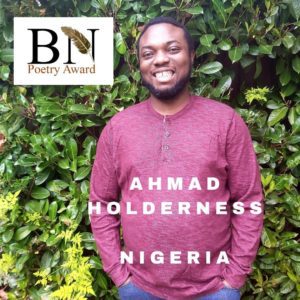I am Andrew Herbert Omuna, a teacher by profession. My passion about arts has been evolving with changing times or state of mind at the time. I love film, writing, art and travelling. One of my poems; Ode to the yellow party, was published in the Best New African Poets 2016 anthology. I write most of the time when I feel there is some idea that sparks my desire to put something down on paper. And although these don’t come that often, when one comes, even the other ideas that have been kept in the back do come up during this creative moment. I also write as a way of speaking my mind on paper, given that most of the time is spent on observing what is around me. These moments help me create some path for hopefully publishing a collection one day.
My inclination to submit to the #Babishai2020 haiku award wasn’t abrupt. I had one time applied with a full poem, although it didn’t make it anywhere that time. When this opportunity availed itself again, I thought it better to try out with the haiku. I had never written any haiku before, but with the basics of a 5-7-5 format, I decided to take on the challenge. And because I first saw the call for submission on the night of 31st Dec 2019 – 1st Jan 2020, I knew I had to try something new and make this a year for writing more often, and if possible, compete.
After seeing the call for submission for the haiku, it was then about doing some research into what made a piece be called a haiku. Although there are regular and irregular forms of haikus, I stuck to the regular form of 5-7-5. On the days I saw the call (night of New Year 2019-2020) and when I wrote the haikus (night of 1st March 2020), it was about what I loved most and what I was going through at the moment. I was doing the night shift on those days and yet I also loved my sleep. This was the first haiku I actually wrote that night. It had to be something about sleep and the many pieces of advice I had heard about too much sleep. With the idea sorted, the rest was about making choice of words fit within the 5-7-5 format.
the morning rain falls
endlessly hugging thy sleep
frozen ideas die
by Andrew Omuna
The African haiku, as is with many other forms and genres of writing, might get swallowed up by the generalization of academic theories often formed for other kinds of “reading.” If the future for the African haiku is to blossom, I would like to see content revolving around our community. Relatability is very important. Although the origin might not be African, the uniqueness of our experiences, adaptability to the form, having more calls for haikus, could help create a role within the vast free form of poetry generally known by the greater African population.
I would think of creating an awareness drive with other poets, performers and writers, to challenge themselves by creating haikus as part of their works. Since majority of creative writers are more familiar with free verse poetry, getting into this space will create an extra experience of brief poetic forms. Publication of these haikus, whether in paper print or online would help push this experience to a global milestone. Lastly, since the haikus are brief, the chances of them accompanying other forms of media is great. Art pieces, outdoor displays, creative art classes can all lend a hand in pushing this experience to more people in Uganda and around the world.
…..

